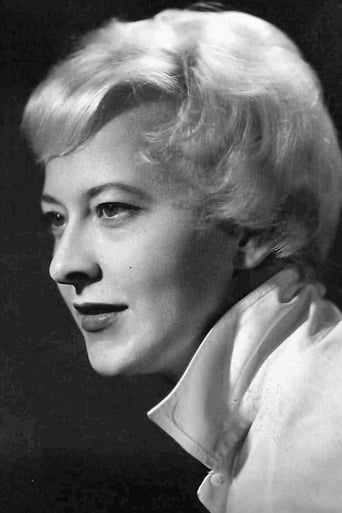PodBill
Just what I expected
Merolliv
I really wanted to like this movie. I feel terribly cynical trashing it, and that's why I'm giving it a middling 5. Actually, I'm giving it a 5 because there were some superb performances.
KnotStronger
This is a must-see and one of the best documentaries - and films - of this year.
Kaydan Christian
A terrific literary drama and character piece that shows how the process of creating art can be seen differently by those doing it and those looking at it from the outside.
jacksononthemoon
Why they claim this is a comedy is beyond me. There are funny bits in it of course, but it is a family and community drama, brilliantly acted. Engaging right from the first few minutes.It also has the best and most powerful curse I have ever heard in my life and I have heard a few! I highly recommend this to anyone. There are some harsh bits, so this would be Parental Guidance at the least.
gradyharp
ANTONIA'S LINE continues as fresh today as when it was released and awarded Oscars in 1995. This very fine little Dutch film mocks the old adage of 'You can't go back home again' by introducing Antonia and her daughter returning to a village she had abandoned and setting up changes among the odd assortment of townsfolk that initiate a heritage of both wonderful and tragic events, each of which is a parable about family and community. The women rule here, even to the point of deciding to conceive by barter, by compulsion, and by taking arms against the macho power symbols of rape. All manner of variations of normal (spiritually possessed, moon howlers, disillusioned priests, mentally retarded, social outcasts) come under the influence of Antonia's strongly world-wise persona. The results are like a fairy tale for adults, both in content and in the wonderful visual effects. The cast is extraordinary as is the pacing of the direction. The message of this film endures - it pleads to be viewed regularly.Grady Harp
lastliberal
It takes courage to grow up and turn out to be who you truly are.I can't think of any other platitude that better describes this amazing film by writer/director Marleen Gorris. The Motion Picture Academy felt as strongly as I do, as they awarded it an Oscar; a well-deserved Oscar, I might add.It is about the progeny of Antonia (Willeke van Ammelrooy), a woman who returns to her village after WWII and begins life with her daughter Danielle (Els Dottermans). There is never any mention of a father. This is a feminist film in the purest sense. Men are not bashed, but there is a sense that they are not very useful, except for producing more daughters.Danielle seeks a male to impregnate her and bears a child prodigy, Thérèse (Carolien Spoor, Esther Vriesendorp, and Veerle van Overloop), Thérèse becomes a pupil of the town intellectual Crooked Finger (Mil Seghers) and cannot find a man who can satisfy her intellectually and physically, so she settles for the physical and has a daughter of her own.Men in this movie serve as seed bearers, or teachers, or comfort bearers, or, in one case, messengers of evil, as one manages to rape two women.But the film is not just about feminism, it is also about acceptance. Antonia never hesitates to give comfort and shelter to anyone in need, whether it bee someone with an intellectual disability, the raped sister, the woman who loves having babies, or the priest who finds that celebrating life is better than celebrating death.Her own daughter finds love in the arms of Thérèse's tutor, and this is not judged, only accepted as another part of life. Everyone seems to find love in Antonia's circle, and her real progeny is exceeded by those she touches with love and acceptance.It is a beautiful story with a wealth of interesting characters. Gorris is an amazing writer and one can only be thrilled at her talent.
leg_and_hammer
Antonia's Line…..(the only important, inspiring math-movie) Here is a stark contrast in movies about the subject and culture theory of mathematics in a modern biographical/educational setting. It's a foreign film, Dutch, and it provides a contemporary alternate point of reference for the many examples of mathematics involved cinema in American film. And what it tells Americans about their society, it's institutions of film and government, how they are seasoned with psychological, anti-intellectual propaganda is fascinating. Those conditions have their pronounced features for different historical reasons, geography, culture drift and the unique roll of the U.S. since WWII and of course the synergy between mathematics, war technology and the evolution of the Cold War to permanent information war. Part of that war you see has opened up a front specifically treating mathematics whereas it had long since considered the public and public education critical targets for softening and fluorochemical bombardment directly linked to today's epidemic mental retardation anomaly--The war not only against information, but the war against mind; and the staple brand manufacturing of the U.S. public educator as motion picture laughing stock in a devil may care, entertainment commercialized riot zone on what the electorate is supposed to keep throwing away its taxes and the students their disposable income, trend adoption, affected attitude, style, mannerisms and other grievously wasteful contaminations.The movie sets its own pace, follows the development of a little girl and her close-knit communal ties. Indeed it would appear that in the structuring of the mathematician here it does 'take a village'. And she turns out to become a remarkably gifted algebraist/group theorist of some kind. We could parallel this film through a procedure often employed in mathematics, what's called an Extension to another European movie "Mindwalk", where we could imagine catching up to her after her career had gone through a government military closure working on SDI in physics. This is the woman the politician's friend takes him to see on Mt. San Michelle; and by this procedure of comparing biographical cinema in the sciences better appreciate its span and gender specification through the traditional underdog in the stereotypically male dominated arenas of math and science.For one thing, the main character isn't portrayed as crazy or mentally ill; if that's important in establishing the sharp contrast repetitively marring American genre in this same category. So the film is a great relief from the mental cruelty heaped on intellectual aspirations in a perennially bullied and sinking American educational decline, promoted through the mass industry of Hollywood film propagandas marketed as so called 'entertainment'. 'Buyer beware.' Not to bother comparing it with the far inferior movie 'Proof', even in the biographical abundance that would have been available to structure a film about John Nash, "A Beautiful Mind", a wide ranging set of life experiences also caught up in Europe for an extended time, instead a hack biographer is selected to play up the crazy smear in order a distortion in film can be manufactured from that template. Chalkboard scenes are important litmus for calibrating the realism or contrivance, in Antonia's Line you have a far more natural setting, in the Nash film something completely different, i.e. yet another instance of 'throwing away the textbook', similar to the classroom setting in 'Dead Poets Society', and a storming of the lecture by an overzealous psychiatrist's Gestapo when Nash lectures on The Riemann Hypothesis. Induce, then blame the victim—the usual knuckle-dragging monkeyshine's half-truths and characteristically feckless White lies. The American audience is dismissed as childish enough to have those sorts of overt propaganda coercions foisted on them without comment or feedback, what are really unqualified abuses of portrayal, demeaning to education and educators and really amount to nothing more than the usual crass bullying of another intellectual that has come to supplant better film and literature development in this country domineered instead by 'Animal House' and high school movies trying to reduce our establishment to zoos and mockeries in terms of international standards. Through this filter of film culture-study a picture of the Cold War victor begins to take on a caste of embedded contradictions…not so much the friendly film skies and greatest country in history…as it is in fact a continuation of the social war of the 1960s, a jingoistic sniping at the public from hidden bunkers and assassin boy scout camps of no account, now more contained in how the news media selectively manages the gathering dirty secrets as they pile up, cumulate in unexplained pandemic disease prevalence or just happen to come crashing down in tons of steel and debris for no official, discernible reason. If, upon weighing the available fare, interpreting and selecting from the alternatives this review stimulates a greater interest to seek out foreign film equivalents rather than continue to be bludgeoned by the bad parent of Hollywood imitations, hopefully the better informed consumer choice will result in a healthier film-going experience avoiding such obstacles to unhindered aspirations.





